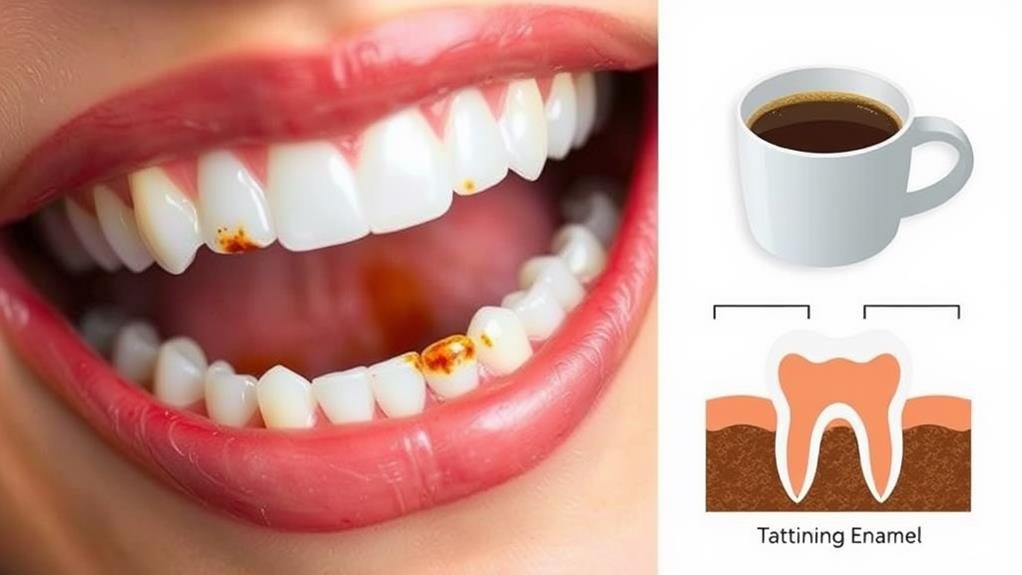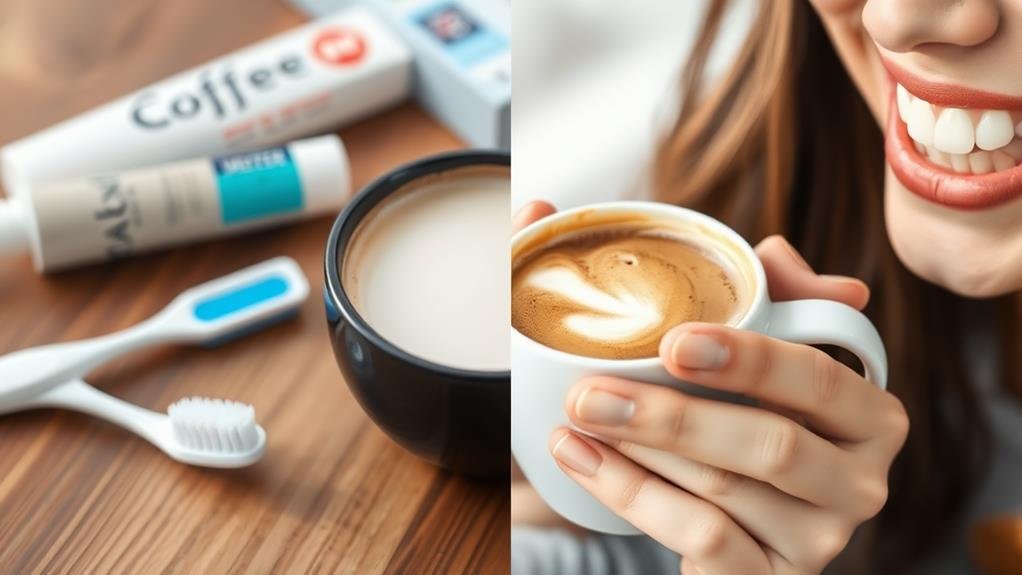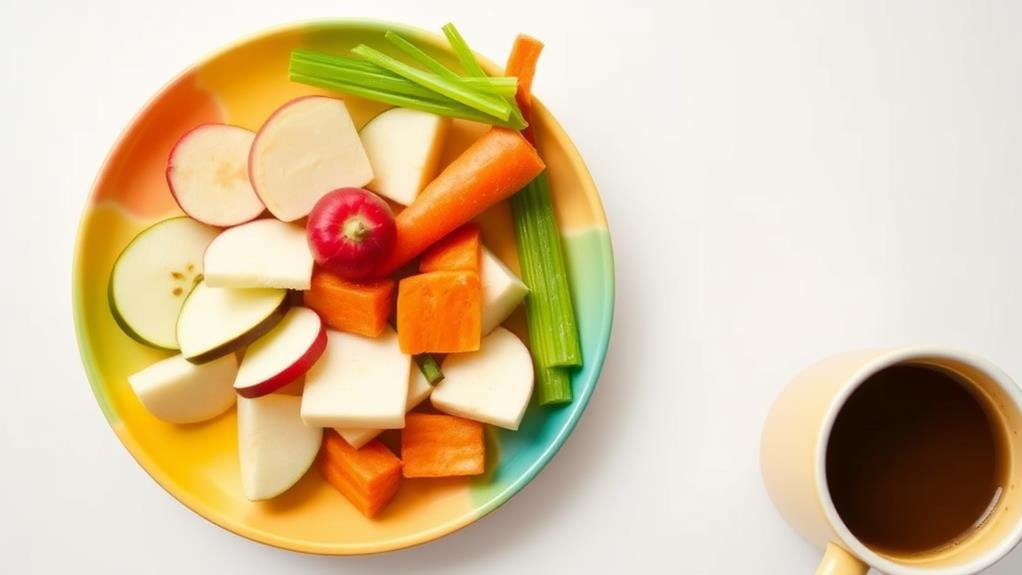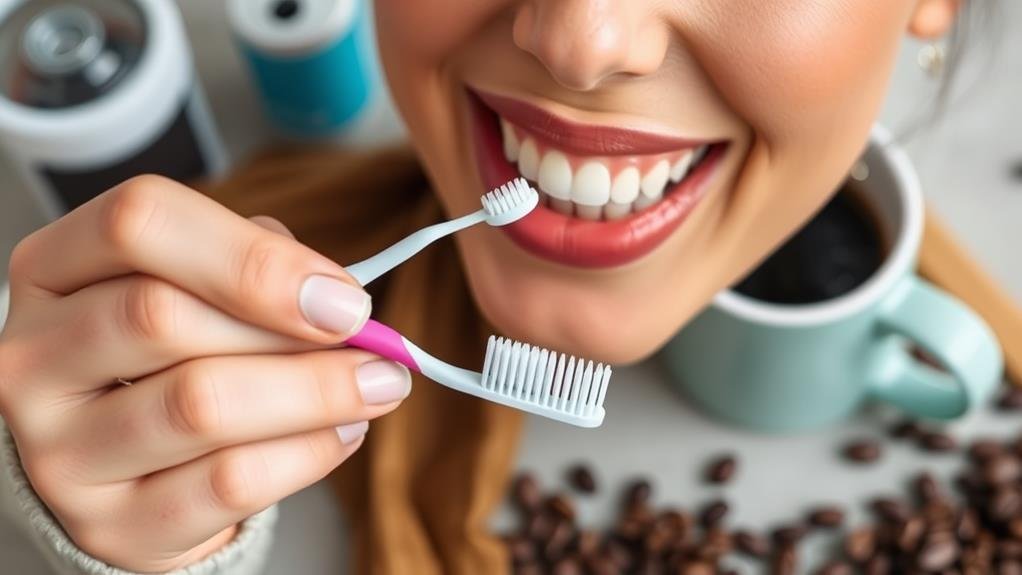As a coffee enthusiast, I've often found myself wondering how to enjoy my daily cup without the inevitable teeth staining. It's fascinating to note that the culprit behind these stains is not the coffee itself, but rather the tannins it contains. These tannins adhere to tooth enamel, leaving behind unwanted discoloration. But there are ways to mitigate this issue. By using a straw, adding cream or milk, and rinsing with water afterward, you can significantly reduce the risk of staining. Curious about other strategies? Let's explore some handy tips that can help you enjoy your coffee while keeping your smile bright.
Why Coffee Stains Teeth

Coffee stains teeth due to its rich content of tannins, which are compounds known for their ability to seep into the tiny pores of tooth enamel. When you drink coffee, these tannins easily penetrate the enamel's surface, causing noticeable stains over time. The acidity in coffee also plays a role in this process. Although coffee is less acidic compared to some soft drinks and fruit juices, its acidity still contributes to enamel wear, making teeth more susceptible to staining. Regular cleaning and maintenance of your coffee maker can also affect the quality of your brew, which indirectly impacts how staining occurs, as using lemon juice for cleaning can help maintain the flavor of your coffee.
The impact of tannins isn't unique to coffee; they are also found in black tea and red wine, which can similarly discolor teeth. However, it's the combination of tannins and acidity in coffee that makes it particularly effective at leaving behind stubborn stains. Understanding this mechanism is vital for taking preventive measures against tooth discoloration. By recognizing how coffee interacts with your teeth, you can better protect your smile while still enjoying your favorite beverage.
Preventing Coffee Stains
To prevent coffee stains, I limit my coffee intake and use protective measures. Drinking through a straw can help minimize direct contact between coffee and my teeth, reducing the risk of staining. Additionally, maintaining good oral hygiene by brushing and flossing regularly is essential in preventing these stains from setting in. It's also beneficial to rinse your mouth with water after consuming coffee, as this can help wash away any lingering residue and reduce the likelihood of stains. Regularly cleaning your coffee cup, such as a Yeti coffee cup, can help maintain its cleanliness and prevent any odors that might transfer to your beverage.
Limit Coffee Intake
Limiting your daily coffee intake is vital if you want to keep your teeth stain-free. Excessive coffee consumption can lead to more pronounced tooth discoloration, which can impact your confidence in social and professional settings. To maintain your oral health and keep your smile bright, it's important to limit your coffee intake.
Limit Your Coffee: Aim for no more than two cups of coffee per day. This moderation helps prevent enamel staining and reduces the risk of tooth discoloration. Brushing immediately after drinking coffee can also help prevent stains from setting in. However, even with regular brushing, excessive coffee consumption can still cause significant staining over time.
Use Protective Measures
While limiting your coffee intake is a good starting point, there are additional steps you can take to protect your teeth from staining. One effective method is to drink coffee through a straw, which minimizes direct contact with your teeth and reduces the risk of stains. Another strategy involves adding cream or milk to your coffee; these dairy products can help prevent tannins from sticking to your enamel and causing discoloration.
Rinsing your mouth with water immediately after consuming coffee is also essential. This simple act can wash away residual tannins that might otherwise contribute to staining. Maintaining good oral hygiene is vital as well—brushing your teeth at least twice a day and flossing daily can help remove surface stains and keep your teeth clean.
Avoiding the addition of cream or sugar to your coffee can also be beneficial in preventing plaque formation, which contributes to staining. By incorporating these protective measures into your daily routine, you can enjoy drinking coffee without worrying about the stains on your teeth. These habits will help you maintain a healthier smile while still indulging in your favorite beverage.
Maintain Oral Hygiene
Maintaining good oral hygiene is essential for preventing coffee stains on your teeth. Brushing your teeth at least twice a day is a pivotal step in this process. By doing so, you prevent coffee stains from settling on the enamel of your teeth, which can lead to discoloration over time. Additionally, flossing daily helps remove hidden food particles that can contribute to staining.
Rinsing your mouth with water after drinking coffee is also beneficial. This simple act helps remove residual tannins, which are the primary culprits behind coffee stains. If you're particularly concerned about maintaining white teeth, consider using a whitening toothpaste as part of your routine. These toothpastes are specifically designed to combat and prevent staining.
Avoiding additives like cream and sugar in your coffee can also make a difference. These ingredients can increase plaque buildup, which in turn can lead to more staining. By sticking to these habits—brushing, flossing, rinsing, and using the right toothpaste—you can enjoy your coffee without worrying about the negative impact it might have on your teeth. Consistent oral hygiene practices are key to preventing coffee stains and keeping your teeth looking their best.
Limiting Coffee Intake

If you're a coffee enthusiast, you might be wondering how to enjoy your daily cups without sacrificing the brightness of your teeth. Limiting coffee intake is an important step in preventing excessive teeth staining. By keeping your coffee consumption to two cups a day, you notably reduce the risk of stubborn stains that can discolor your teeth over time.
Drinking coffee in moderation supports better oral health and helps maintain a brighter smile. Excessive coffee consumption can lead to more pronounced staining, making it harder to keep your teeth clean and white. Monitoring and limiting your coffee intake is key to preventing notable staining.
Using a Straw Effectively
Using a straw when drinking coffee is a simple yet effective way to reduce direct contact with your teeth, thereby minimizing the risk of staining. This method is particularly beneficial for those who enjoy iced coffee, as it can help minimize visible tooth staining.
When you drink coffee through a straw, the liquid bypasses the front teeth and doesn't come into direct contact with your enamel. This is essential because coffee contains tannins, which are known to contribute to teeth staining.
Here's a quick overview of how using a straw helps:
| Aspect | Effect |
|---|---|
| Direct Contact | Reduced |
| Front Teeth Bypass | Yes |
| Enamel Protection | Enhanced |
Adding Creamer or Milk

When I add creamer or milk to my coffee, I notice that it helps prevent tannins from sticking to my teeth and causing stains. The casein protein in milk is key to this effect, as it attaches to tannins and reduces their ability to discolor enamel. By including creamer or milk in my coffee routine, I find that it creates a protective barrier against these stains, leading to fewer noticeable marks on my teeth.
Prevents Tannin Sticking
Adding creamer or milk to your coffee is a simple yet effective way to prevent tannins from staining your teeth. When you add milk or creamer, the casein in these dairy products attaches to tannins, reducing the likelihood of stains on your enamel. This process creates a protective barrier on your teeth, minimizing the impact of coffee tannins.
The key here is the casein content in milk. Casein binds with tannins, preventing them from adhering to your teeth and causing discoloration. By incorporating milk or creamer into your coffee routine, you can maintain a brighter smile by reducing tannin adhesion. This method is straightforward and requires minimal effort but offers noticeable benefits in terms of dental hygiene.
In essence, using milk or creamer not only enhances the flavor of your coffee but also serves as a preventive measure against teeth staining. So next time you brew a cup of coffee, consider adding some milk or creamer—it's an easy step towards keeping your teeth cleaner and brighter for longer. This small adjustment can make a big difference in maintaining your oral health while still enjoying your favorite beverage.
Reduces Stain Formation
By incorporating creamer or milk into your coffee, you greatly reduce the formation of stains on your teeth. This is because the casein protein in dairy products binds to tannins in coffee, preventing them from adhering directly to your teeth. This binding process helps neutralize the acidic properties of coffee, which in turn reduces enamel erosion and subsequent stain formation.
Adding creamer or milk creates a protective barrier on your teeth, minimizing direct contact with staining compounds in coffee. Over time, this protective layer can lead to fewer visible stains on your teeth. Regularly including dairy-based creamers in your coffee routine is particularly effective because they offer better protection against stains compared to non-dairy alternatives.
In essence, incorporating creamer or milk into your coffee not only enhances flavor but also plays a significant role in reducing stain formation. By creating this barrier and neutralizing acidic properties, you can enjoy your coffee without worrying as much about the negative impact it could have on your teeth. This simple addition can make a noticeable difference in maintaining cleaner and healthier teeth over time.
Drinking Water After Coffee
Drinking water after your morning coffee is one of the simplest yet most effective ways to protect your teeth from staining. By doing so, you help wash off the stain-inducing components that coffee leaves behind. Gargling with water post-coffee consumption is particularly beneficial as it reduces the adverse effects of coffee on your teeth.
Water intake immediately after drinking coffee minimizes its impact on your teeth. This practice aids in maintaining oral hygiene by rinsing away coffee residue, which can otherwise adhere to your teeth and cause discoloration. Consuming water post-coffee breaks helps prevent staining and supports dental health.
Incorporating this habit into your daily routine is easy and can make a noteworthy difference in the long run. After sipping your coffee, take a few moments to drink some water or gargle thoroughly. This small action can significantly reduce the risk of tooth staining and contribute to better oral health overall. By making this simple adjustment, you can enjoy your coffee without worrying about its negative effects on your teeth.
Eating Stain-Preventing Foods

When you're looking to protect your teeth from coffee stains, incorporating crispy fruits and vegetables into your diet can be an extremely effective strategy. Foods like apples, celery, and carrots are great examples of stain-preventing foods that can naturally clean your teeth and reduce the impact of coffee tannins.
Consumption of crispy snacks triggers saliva production, which is essential for maintaining oral hygiene. Saliva acts as a natural defense against staining caused by coffee. It helps remove coffee tannins from your teeth, creating a protective barrier that reduces the risk of stains.
Incorporating these crispy snacks into your daily diet or even just before consuming coffee can significantly improve this protective effect. By snacking on stain-preventing foods, you're not only promoting better oral hygiene but also safeguarding your teeth against the discoloring effects of coffee.
This simple dietary adjustment can make a significant difference in keeping your teeth clean and stain-free. So next time you reach for your coffee, consider pairing it with some crispy fruits or vegetables to enjoy your beverage without worrying about the stains it might leave behind.
Maintaining Oral Hygiene
Maintaining good oral hygiene is vital in preventing coffee stains on your teeth. Regular dental visits, ideally twice a year, are essential for keeping your teeth clean and free from stains. These visits help remove plaque buildup and ensure that any potential issues are detected early, which can prevent more serious problems from arising.
Using an electric toothbrush, such as a Sonicare, can also be highly effective in cleaning your teeth and preventing coffee stains. These toothbrushes are designed to provide a deeper clean than manual toothbrushes, helping to eliminate any residue that might lead to discoloration.
Additionally, swishing with mouthwash after brushing and flossing can further protect your teeth from staining. Mouthwash contains ingredients that help neutralize acids and reduce the risk of plaque buildup.
Professional cleaning during your dental visits will also help maintain the health and whiteness of your teeth. By combining these practices, you can markedly reduce the risk of coffee stains on your teeth and keep your smile bright and healthy. Investing in good dental care through regular visits and the right tools can make a significant difference in your oral health.
Removing Existing Stains

If you've already noticed coffee stains on your teeth, don't worry – there are several effective ways to remove them. One of the first steps is to use whitening toothpaste. This type of toothpaste is specifically designed to help prevent and reduce stains on your teeth, making it a good starting point if you're looking to remove existing coffee stains.
For more stubborn stains, professional dental cleanings can be very effective. These cleanings target surface stains caused by coffee consumption and other dietary habits, leaving your teeth looking cleaner and brighter.
If your stains are particularly deep, you might consider professional whitening treatments. These treatments involve a bleach solution and light or laser activation to penetrate and whiten the teeth more deeply. This method is highly effective for removing deep coffee stains that regular cleaning and toothpaste can't address.
Regular visits to the dentist for both professional cleanings and whitening treatments are essential if you want to maintain a bright smile while still enjoying your coffee. By combining these methods, you can keep your teeth free from coffee stains and enjoy your favorite beverage without worrying about it staining your teeth.
Conclusion
Drinking coffee without staining your teeth requires a few simple habits. Did you know that over 60% of Americans drink coffee daily? By using a straw, adding creamer or milk, rinsing with water, and maintaining good oral hygiene, you can enjoy your coffee while protecting your teeth. Limiting your coffee intake and eating stain-preventing foods like crunchy fruits and veggies also helps. Follow these tips to keep your smile bright and healthy. Regularly brushing with whitening toothpaste can remove existing stains too.

